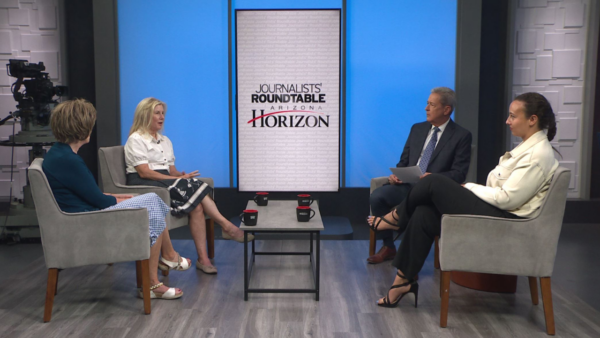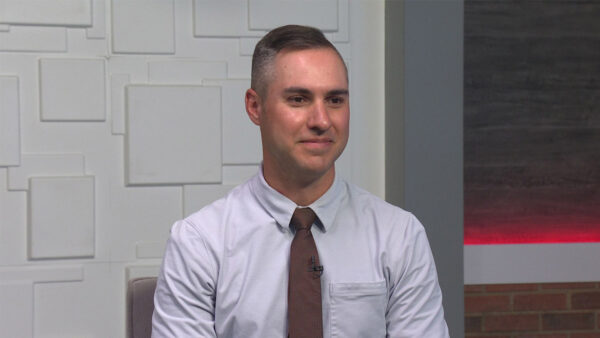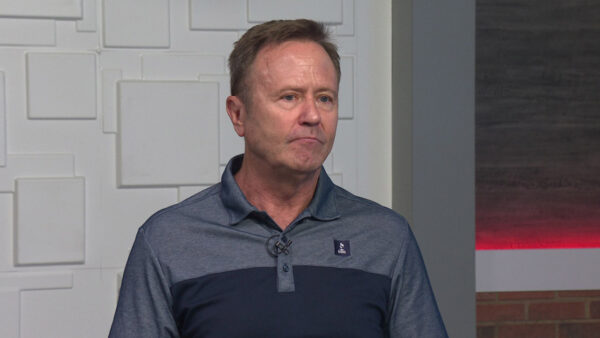Arizona is in the running to win nearly $250 million for public education in the federal Race to the Top competition. As one of 19 finalists, the state recently defended its application in Washington, D.C. Now, it waits to find out if it’s a winner. Eileen Klein, the Governor’s Chief of Staff, and Paul Koehler of WestEd discuss the state’s application.
Ted Simons:
Good evening, and welcome to "Horizon," I'm Ted Simons. Earlier this year Arizona tried to win a major education reform grant in the national "Race to the Top" competition, but the state didn't even come close to making the cut. Arizona is doing much better in round two. Indeed, the state is one of 19 finalists and still has a shot to win at much as $250 million. Here to talk about all this is the Governor's chief of staff, Eileen Klein, who just last week led a group to Washington, D.C., to present the application to a panel of judges. And Paul Koehler is here, he directs the policy center at West-Ed. He was brought in by the Governor to help prepare the application to round two. Good to have you here.
Thank you.
>> Thank you.
Ted simons:
Why did the second application work a whole lot better than the first?
Eileen Klein:
We certainly learned a lot from the first round. After we saw the original results we took an opportunity to review the comments made by the panelists. Then we went back and really looked to make sure we had the foundations for reform, that we really had the plan in place and the momentum, and mostly that we had the community's support. When we found we did, we made sure we engaged a consultant, 3 locally based, Dr. Koehler, who could help deliver that in round two.
Ted Simons:
Seems like things like science, engineering, math, technology, what changed in those?
Eileen Klein:
Obviously, many of the fundamentals were there. We just weren't able to tell our story as well as we could have in the first round. In the second round we really made sure to highlight the terrific things going on in Arizona. And to make sure we highlight science, math, improvements in standards that we've made, we needed to tell our story later.
Ted Simons:
Was it just a question of narrative here?
Paul Koehler:
It was question of narrative and also a question of focus. It had a much better management plan for round two, we were better able to describe how we would manage the money, what we would do with it. We linked the need to improve our education system to the economy in Arizona. We combined those things into a much more coherent application.
Ted Simons:
What about legislation in the past session, things like the third grade, 16-year-olds allowed to graduate, teachers' certifications being altered. All those things play a factor?
Paul Koehler:
A huge factor. The application was based on improving the standards and assessments, improving teacher and principal evaluation, improving the data system, and improving the struggling schools' approach to low-performing schools. There was legislation that came 4 out of the session sign by the Governor in every one of those areas. I think what we did in May and June was to pull that together around those assurances, and really say in the application, Arizona is ready, we can do these things. We need to do them anyway, but it would be great if we could get the funding behind us.
Ted Simons:
Is that how you saw it as well, how the legislature was moving, did those directions help the process?
Eileen Klein:
Absolutely, without a doubt. The great thing is Arizona has a strong tradition of reform. We have 30 years of solid reforms in the very areas the government was interested in seeing progress in. It was a historic year in 2010 of making improvements and all of those contributed to the success of our position in round two.
Ted Simons:
You mentioned the focus or targets. Turning around failing schools was one of them. What was the State saying it wants to do regarding failing schools? I mean, a letter grade is kind of interesting, but it's got to be more than that, doesn't it?
Eileen Klein:
Absolutely. What we looked at was what is our overarching goal? We need to make progress in getting more kids to graduate from high school. One of the great things about the applications, we've aligned those big goals with higher education goals for the year 2020. Building up to that, we need to 5 make sure every student has an opportunity to make progress every year. For instance, we need to make sure students are being taught by the most qualified teachers, that we have a pipeline of teachers available so that districts have the leadership in place, all of the support that students will need. We also had to make changes in curriculum, meaning in standards, to increase our standards and expectations. So the applications really centered on specific strategies. We really want to focus on those key transition areas working towards this graduation goal, improving that graduation rate, we really want to pay special attention at third grade, eighth grade, tenth grade, so we know students are hitting the mound.
Paul Koehler:
We went out and did this enormous outreach, talked to the business community, everyone in the education community, foundations, everyone that would talk to us about, if we were going do this again, what do we have to do differently and better? That was the advice, really focus on a terminal goal, improving the graduation rate, which is key. Our graduation rate, people argue about the number but let's say it's 70%, maybe 72%. It's not good enough in this economy for sure. We got great advice from the stakeholders who said, focus on something you can measure and go backwards to those transition points, third, eighth, tenth.
Ted Simons:
Very controversial is the linking of teacher pay to 6 student performance. That's something that apparently "Race to the Top" is focused on. What was Arizona's proposal and what are your thoughts on those lines?
Paul Koehler
The proposal was we had legislation in place, SB 1040. Arizona will develop a system that fairly and objectively links data to a teacher's performance. 33% to 50% should be based on data that's now over at the state board of Ed. They have a year and a half to figure out what that's going to be. Our proposal -- other states doing this, they are doing it and have done it very well. What process did they use? So we didn't start from scratch. The other thing, Ted, was a major outreach to the Arizona Education Association. We went to them early and often in the second round and said, look, we can't do this work without the teachers. You represent 34,000 teachers in the state. We need to have you with us, you need to be at the table helping us. They came across and said, you bet, we will.
Ted Simons:
How did they come across when something like teacher evaluations is so controversial and the union is not that excited about it?
Eileen Klein:
There have been challenges and teachers are feeling the pinch of the recession and reduced budgets. We talked through, and the key really from the Association's point of view is the ability to do things with them, together. 7 There is that strong commitment, as there is with education leaders across the state, to make sure we work through the implementation of these reforms together.
Ted Simons:
Seems like the "Race to the Top" folks are looking for that cooperation.
Eileen Klein:
They are, absolutely. One great thing Arizona can point to, ours is truly a statewide platform for reform.
Ted Simons:
Critics of "Race to the Top" say that it diminishes local control, that it's a federal intrusion into state policy, these sorts of things.
Eileen Klein:
Understandably, Arizona has a proud tradition and a very decentralized system of government and strong belief in local control. "Race to the Top" allows us to maintain that. It allows the districts to still choose how they are going to teach. They will be higher than the standards we have today, but schools will have discretion about how to get there. The State will provide resources and leadership training. And the other professional is tied to university academics. So districts have those resources to implement.
Ted Simons:
But still, I'm hearing criticism that you've got to toe the line and do X, Y and Z, and they are holding out the money for you to do what the federal government wants. How do you respond to that?
Paul Koehler:
Two answers to that, Ted. For sure, it's driven by the federal level, no question about that. Particularly the western states are sort of feeling that a little more than maybe some of the 8 eastern states. It's true, but on the other side, which of the four priorities would Arizona not want to do? Do we want better data systems for our schools? I think we'll sign on for that. Do we want to improve the lowest performing schools? We're doing it now without the funding. How about improving teacher and principal evaluations? Everyone agrees it has to be done. And how about better assessments and standards? The four things the government wants us to do, Arizona has started to do. As Eileen said, the way we're going to do it and still get the funding, we've got a huge win here.
Eileen Klein:
If we're going to be competitive in the global economy, we have to have improvements in student performance. We would be delighted to have the funding to support the effort.
Ted Simons:
I'm going to ask what you're going to do with the money, should we get it. Let's start with what you're going to do if you don't get it.
Eileen Klein:
Certainly we're hopeful that we will receive the dollars. If we don't, the terrific thing about the process is we have a lot of buy-in now to what's considered to be the blueprint for making progress in each of these performance areas. And we're not shooting for a goal 10 years down the road, but right away. By having this new blueprint 9 form we're going to be able to move forward. Certainly we'd like the funding help to do it.
Ted Simons:
Win or lose, you've got the blueprint. If you get the money, do the wonderful ideas get lost in a stampede? Is it just one big rumble out there?
Paul Koehler:
It better not be. I think the plan really describes how we're going to roll this out. There's a strong executive management team that'll be set up immediately to precede us. The regional centers that do the outreach, a lot of experts brought in. I think it's well organized and very purposeful. It lasts four years, half of the funds stay at the state to implement the things we're talking about. The other half, $125 million, are shared by the School Districts and charters signed on as partners. In the aggregate, we have enough School Districts and charters that represent 92% of the students in Arizona signed on. A good place for stakeholders and partners to start in.
Ted Simons:
Last question: When do we find out?
Eileen Klein:
We're hoping by the middle of the next week. August 26th or 27th.
Ted Simons:
I think most folks would say good luck.
Paul Koehler
Appreciate that. Thanks, Ted.
Eileen Klein:Chief of Staff to the Governor;Paul Koehler:WestEd;























